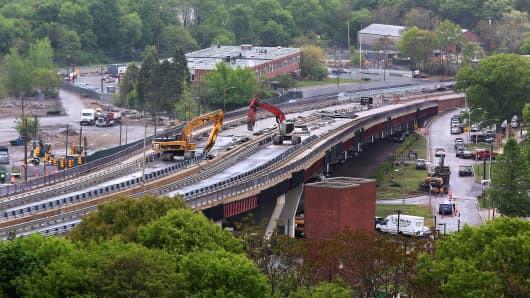Our transportation infrastructure is ubiquitous, but it is not free. Nor has Congress considered it important enough to make the tough decisions necessary to ensure that it will be maintained for future Americans. That's where the Bridge to Sustainable Infrastructure Act comes in. Led by Republicans and Democrats as well as members of the House committees responsible for transportation policy and funding, it puts Congress on notice: Either meet our nation's transportation needs or explain to the people we represent why they aren't a priority.
Read MoreU.S. Senate Democrats press for Amtrak funding increase
For too long, our Highway Trust Fund has been drained by easing the congestion that causes $121 billion annually in lost productivity and overwhelming frustration every year without being fully replenished. America's roads and bridges are on a crash course with a bounced check, and the Bridge to Sustainable Infrastructure Act would give Congress exactly one year to find a solution.
Right now, people who use our roads are paying for only about 66 percent of the cost of those roads through the gas tax. The remaining 34 percent, approximately $16 billion every year, is consuming dollars that might otherwise go towards medical research or care for veterans, and is being paid for by all Americans regardless of road use. Our legislation, the Bridge to Sustainable Infrastructure Act, would index the gas tax to future inflation and provide Congress strong incentive to bring our transportation costs and revenue under control by creating an automatic revenue increase if Congress fails to act in a year. A prevailing principle is at play here: If something is important enough to buy, it is important enough to pay for!
Fundamentally, there are only two ways to address a $16 billion annual shortfall: cutting costs and raising revenues. In reality, it will probably take some combination of the two to close this gap. When it comes to cost-cutting, we made significant strides in the last transportation bill, MAP-21, with extensive consolidation of programs and an aggressive streamlining review process. Solutions ranging from corporate-tax repatriation to ending the gas tax in favor of a fee based on miles traveled have been proposed. Those options along with others all merit further study. There won't be an easy solution to this problem, but the longer Congress ignores the issue and kicks the can down the road, the worse the problem is going to get.
Read MoreStop worrying about this ancient indicator
I introduced the Bridge to Sustainable Infrastructure Act with legislators who have very different opinions about the role of government in society, but I believe it is a conservative principle to actually pay for the things you buy instead of sticking our kids and grandchildren with the bill. They'll have their own needs in 20, 30 or 40 years and they shouldn't be forced to pay for our purchases as well as their own. Safe and efficient roads and bridges are good for our economy, good for families, and good for our future … we should build them, maintain them and pay for them.
This legislation isn't glamorous, and won't be popular with my colleagues in Congress, but I didn't come to Washington to make friends—I came to help solve our nation's problems. It is my sincere hope that this will be the start of the push that our government needs to finally solve our transportation-funding shortfall which has persisted for nearly a decade, and that our nation will remain the best place in the world to do business.
Commentary by Reid Ribble, a Republican congressman from Wisconsin. Follow him on Twitter @RepRibble.
Read MoreDow is a 'brick wall' waiting to collapse: Yamada


